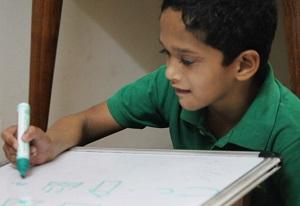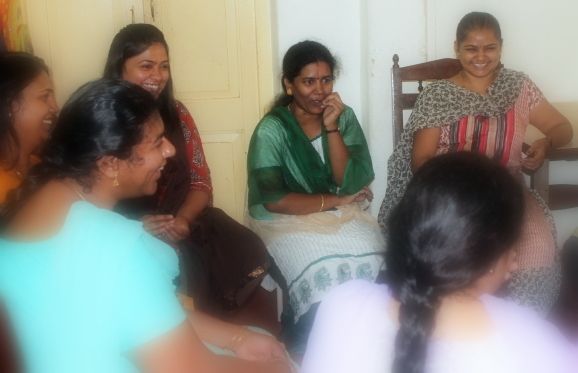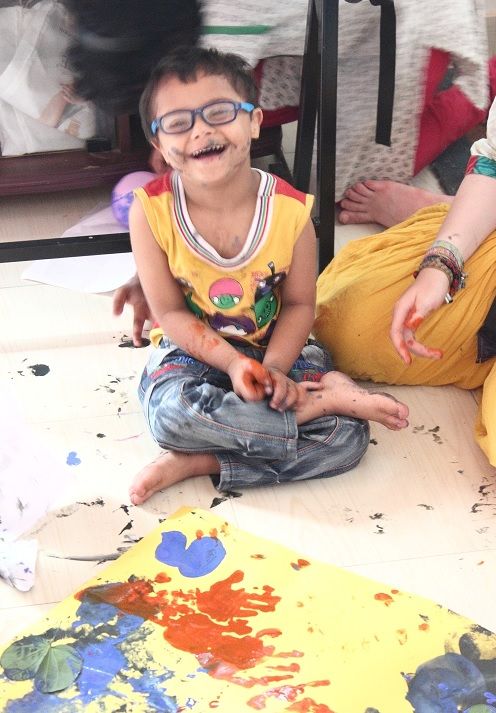
Tamahar not only tries to develop the children with various activities, it also brings the family, the primary caregivers, into its fold to help them grow and learn with the children. Vaishali Pai is a visionary and an experienced occupational therapist who set up the Tamahar Trust in 2009 to help children with special needs find their own little spaces in this world. She shares how she would like Tamahar to reach out to more children in future.
Tell us briefly the thoughts behind forming Tamahar.
Travelling to work 20 kms away in a crowded bus every day I could see families with children with disabilities struggling to travel long distances to get to the few centres offering therapy services. By the time they reached the centre, both the child and parents would be tired. Some of them would spend an entire day in this pursuit. People who had hardly enough money to eat had to spend it on bus tickets. Some children were heavy, carrying them was tough. I realised there was a need to have centres all over the city. In a crowded city like Bangalore, we need one every 5-7 kms. The need is that high. Every intervention that is needed, if can be provided under one roof was another idea, parents then don’t need to run from one place to another looking for professionals and services. This was the main reason why Tamahar started.
Tamahar doesn’t just educate children with physical and mental disabilities, but also believes in supporting their families. Could you please explain?
Like a regular school going child who comes home from school and shares experiences with parents, our children cannot do so. Unfortunately, our families (parents) are more in need of knowing exactly what is happening at their schools or therapy centres. We, at Tamahar, believe that parents are primary therapists, they continue with the therapy programme at home, ensuring a 24-hour intervention. This is possible if therapy techniques and teaching techniques are shared with the family and they are encouraged to continue working with the child at home. It is compulsory for our parents to be part of the programme where they are given both theory and practical training on an ongoing basis. Other programmes for the parents include: Support groups for mothers and fathers separately. This is a safe place where parents come and share their fears, anxieties, needs, experiences under the guidance of a clinical psychologist.
We also have a Respite Care programme. Taking care of a child with special needs is a 24/7 job, there is no respite. By providing a safe place to keep the child for short periods like 3 hours or 6 hours, the parents know their child is well taken care of and they are free to pursue their own activities. For the respite care programme, we have tied up with another organisation which offers these services.
You believe in not just caring for the children, but organising special programmes for the mothers, siblings and other relatives. Is it a new thing in caring for children with disabilities? And how do you go about planning it?
For us a child with special needs cannot be separated from the family and given interventions. Every individual from the family undergoes problems if there is a young child to take care of all day, all year. Through programmes that either enhance their knowledge about special needs, or relieve them of stress, we ensure as relaxed an atmosphere as possible. Harmony in the family encourages better development in the child with special needs. Mothers get together once a week. With a clinical psychologist guiding the sessions, mothers are encouraged to share their feelings, learn different skills and vent out their fears and frustrations. They have special dress-up days, movie days as well as other outings. Fathers have a similar session once a month. They get together to also discuss future plans, programmes etc. Siblings come together once a year during the summer camp time. Special programmes are arranged for recreation or to ensure they get an opportunity to share their issues in a safe environment. Thrice a year we also have full day training for both parents where lectures are organised on various topics related to brain damage and development. Apart from this, parents get regular practical and theory classes on an ongoing basis throughout the year.

“Parents are the best therapists once they understand what their children need.”: Can you please explain this?
In developmental delay, in which a child’s development gets delayed due to various reasons, one of them being that the child’s brain is damaged and hence the brain is not equipped to guide his growth, therapy cannot be restricted for a few hours a day, it has to be an ongoing programme. Who better to do this than the family which spends all the time with the child. Instinctively, the parents generally know what is right and what is wrong for the child, and if we combine that with some technical knowledge, then the child gets continued support at home too. We teach best positions for children to be put in, feeding skills, how to teach children to be independent in self-care, and, of course, specific techniques to encourage regular development.
What are the various kinds of therapies that you extend to children with special needs?
Typically, new born children start interacting and learning from the immediate environment soon after birth. As they grow, their movement in the surroundings, their ability to observe teaches them how to move, how to improve and preserve function. Simultaneously they also get the required emotional maturity. Children learn to speak, move, use their hands for working, and think simultaneously. Children who suffer brain damage do not get this opportunity.
In Tamahar we provide opportunities for them to work on all their functions together. We have developed a methodology using this concept. We provide that in a one-on-one situation, where one interventionist works with one child for one hour. In this we combine Occupational Therapy techniques, Speech Therapy techniques and Special Education. They have one and half hours of social activities after this. This is our Pre-School programme, a programme that prepares children to start learning academics. This continues till the children master skills of a 5-year old, after which the children get transferred to our school where we teach functional academics - English, Maths, Kannada (or Hindi), EVS along with extracurricular activities like gardening, out-door and in-door games, Yoga, Music, Dance, Art and Craft.
Yoga therapy, Music Therapy are given to all children twice a week. Recreation Classes (Dance and Fun-Art) are twice a month, Sports coaching is held once a month. For all the children who need it, Physio Therapy is given two or three times a week as necessary. Children are also taken out regularly for field visits, e.g., to a hospital, the Metro rail, Supermarkets, etc.

You are also committed to addressing children from low income groups. Would you like to tell us about it?
Poverty and disability grow together, it is a vicious cycle. Unfortunately, families from low income groups do not get the necessary intervention for their children, very often due to financial constraints. Tamahar is committed to providing quality services to all children irrespective of their socio-economic status, religion, caste, creed. All children get what they need. We have a number of programmes for both the children and their families and the services are the same for both rich and poor families. We want to have our presence in geographical locations in both cities and villages where such facilities are not easily available.
Tell us a little about your team.
We have special educators, physiotherapists, clinical psychologists, Yoga therapists, Music therapists, teacher trainees. We work in a sector where professionals are difficult to source out, especially since the need is also very large. At Tamahar, we offer training to women who like working with children (whether or not they are trained in regular development or special needs). This gives us increased manpower, and it provides jobs to women. We are proud of our women empowerment programme!
Do you think Tamahar stands apart from other organisations of its ilk? If so, how and why?
The reasons why I think Tamahar stands apart are many:
- Parents are essential: parents are not bystanders who observe therapies, they have to participate in the programme hands-on. This is compulsory at Tamahar. Other places do not encourage this.
- Developmental age and growth is important: Most schools admit children according to their chronological age and also start their training according to those ages. This creates a difference in their understanding and ability and what they are being taught. We start working with children according to their inherent skills and develop them to their chronological skills.
- Emotional development is important: From birth, children start a journey on emotional development. This prepares them for all the trials of later life. Our children do not get that opportunity; at Tamahar we ensure that situations help in this emotional growth. Well rounded personalities, giving extracurricular is how we ensure this emotional development. Most schools focus on the necessity of the children to function, we believe that our children need to enjoy life, be independent, and live a life of dignity, not with pity from others, hence we provide basic therapies like Occupational Therapy, Physiotherapy, Speech Therapy etc., but also give them recreational activities, sports training etc..
What are your focus areas?
We work with children who have developmental delay due to abnormal brain functioning, in normal parlance it would mean Cerebral Palsy, Mental Retardation, Autism, Chromosomal or Genetic conditions, etc. Basically, these are children who do not get the chance to have a normally functioning brain due to some medical pathology. We work with children from 0 (birth) onwards and continue working with them, providing them with services and programmes as per their developmental growth.
Can you share a couple of success stories with us?
Karthik came to us as an 8-year-old, having never gone to school. Not being able to talk, with no ideas about play, he spent his time punching buttons on his mother’s phone, and rolling on the ground playing with his saliva. During the first week Karthik managed to stay at the centre for a maximum of 10 minutes, which he spent rolling on the ground and playing with his spit. We persisted in our efforts and before the month was over, Karthik started staying for 30 minutes enjoying playing some simple games and understood what toys meant! Today, Karthik is able to work on toys that are more complex and stays for 45 minutes. He has started saying “amma”, “appa”, etc indicating some of his needs with words. He is now eager to start mixing with his peers! Karthik has not been diagnosed yet.
Another example is of 5-year-old Rajshekhar who has epilepsy. When he first visited us during the January camp, he was unable to keep his eyes open, could not walk by himself, was crying continuously. On questioning the mother, we realised that he was not being given his medications to control his fits. We counselled the mother on the importance of medical treatment, which she followed diligently. Today, Rajshekhar regularly attends sessions, and is full of energy. He loves to run around and play games. He has started saying a few words and is a happy bubbly youngster!
For 6-year-old naughty-faced Shreyas, challenges have been his companion since birth. On the 3rd day of life he had his first taste of epilepsy, followed by delayed milestones and unsteady gait. As is the set practice, a detailed assessment was done at Tamahar along with many visits to meet specialists at different hospitals. His diagnosis came back as Lennox Gastaut Syndrome, a difficult to treat type of epilepsy. A therapy plan to improve Shreyas’ quality of life was started along with medications and brain surgery. Shreyas developed an instant liking to one-on-one interactions with play/fun activities like Circle time and Rhyme time. He also adapted to Yoga and this had a profound impact on his physical strength.
A child who progressed rapidly: this child came when he was 8. Developmentally he was 2 yrs old. With brain damaged children, developmental age will not progress much from there in ordinary circumstances. Within 3 years, he went to developmental age of 5, and started basic academics. Earlier he didn’t understand what play, books or toys meant. Now he goes to learn badminton on a proper court. He writes alphabets, is eager to understand stories from story books.






